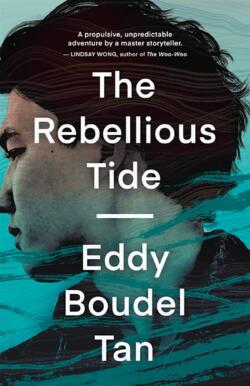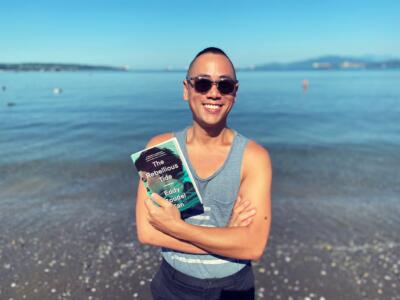1296 The father he had never met
The Rebellious Tide
by Eddy Boudel Tan
Toronto: Dundurn Press, 2021
$21.99 / 9781459746879
Reviewed by Miranda Marini
*
 In his sophomore novel, The Rebellious Tide, Eddy Boudel Tan immerses the reader into the complexities of the human condition evidenced through the characters’ interpersonal relationships as well as their struggles with identity, discrimination, and social stratification. Boudel Tan further emphasises this concept through the ‘flawed hero,’ whose goals and motivations are initially propelled by “the rage that burned inside him” (p. 214) and who later diverts his anger to challenge issues of conformity and oppression.
In his sophomore novel, The Rebellious Tide, Eddy Boudel Tan immerses the reader into the complexities of the human condition evidenced through the characters’ interpersonal relationships as well as their struggles with identity, discrimination, and social stratification. Boudel Tan further emphasises this concept through the ‘flawed hero,’ whose goals and motivations are initially propelled by “the rage that burned inside him” (p. 214) and who later diverts his anger to challenge issues of conformity and oppression.
The novel begins with our flawed hero, Sebastien Goh, who has a perfectly imperfect image in his mind of the father he has never met: Kostas Kourakis. Kostas is described as a “charismatic and bold … ill-tempered brute” (p. 3), who abandoned a pregnant woman and his unborn son to face the world and its derision alone. Although he wondered “why his family was so much smaller than others” (p. 13), Sebastien rarely thought of his father or of his father’s absence; however, “[c]uriosity grew with age, then transformed into blame when he became more perceptive of his mother’s loneliness” (p. 13). Initially, that interest was fuelled by the vague and mysterious stories his mother, Ruby Goh, would share, and even though his curiosity was, at times, unbearable, Sebastien would avoid asking Ruby any potentially upsetting questions, leaving him to concoct his own wild stories. After finding an unmarked box on the floor of his mother’s closet, however, Sebastien begins to piece together the few fragments of information he has found.

Inside the box, a white sailor’s jacket — with K. Kourakis embroidered on the badge — lays neatly folded, and using his deductive skills coupled with some internet sleuthing, Sebastien learns that his father had been a sailor aboard various Greek cargo vessels during his youth and was now a commanding officer on the Glacier — a luxury liner sailing the Mediterranean. Despite this information, it does not explain Kostas’ absence from their lives, and yet, Kostas remains a phantom in Sebastien’s mind, fuelling thoughts of abandonment and rejection, which are paralleled by both Sebastien’s and Ruby’s experiences in the ethnocentric and conformist town of Petit Géant, Québec. But, when Ruby passes away, leaving more questions than answers in her wake, Sebastien realises that he “need[s] an explanation that Ruby had never been able to offer” (p. 14).
Acquiring a job as a photographer aboard the Glacier, Sebastien searches for answers and a way to confront his unsuspecting father, but he uncovers one of his father’s most well-kept secrets before he can do so. As his hatred for his father intensifies and as unrest broils among the oppressed staff and crew, Sebastien finds himself caught in the middle of a political struggle between the powerful and powerless, and the information he now has could change everything.
Even though the plot is heavily driven by this secret and by Sebastien and Kostas’ impending confrontation, The Rebellious Tide is littered — in the best possible way — with complexity and intrigue, delving into the significance of sounds, the strengths and struggles of anger, and the challenges of forming an individual identity among conformists. Boudel Tan also seamlessly incorporates Greek mythology into the text, drawing parallels between Olympus and the ruling and working classes aboard the Glacier, creating an interesting juxtaposition. Personally, I was most interested in Boudel Tan’s comments on classism and social stratification, which are expertly depicted in Sebastien’s interactions and experiences in Petit Géant and on the Glacier.
Ruby and Sebastien, for instance, have always been outsiders — misfits in a town that encourages conformity and condemns individuality and difference. The narrator notes that “[t]he residents of Petit Géant didn’t care for the world outside the town’s borders” and that “the locals had always been wary of outsiders” (p. 6). As a young, pregnant Singaporean woman, Ruby finds herself the subject of the town’s scrutiny and derision because of her ethnic differences, presumed language barriers, and her husbandless status, making it difficult to find friends and consistent, enjoyable work. Nonetheless, she does find work cleaning houses, but while her experiences are mostly positive, she still faces discriminatory and classist prejudices. For example, one of her clients, Genevieve Villeneuve, would supervise Ruby as she cleaned, “want[ing] to be sure that [Ruby didn’t] feel tempted to take anything” (p. 7), and unfortunately, because of Ruby’s seemingly ‘otherness,’ she is labelled a deviant by association.

Similarly, Sebastien is also labelled an outsider through his association with his mother, and we then see this fetishization of the ‘outsider’ through Sophie Lamoureux, Sebastien’s on-again-off-again girlfriend. She claims to love Sebastien “despite his background” and proclaims herself “the benevolent princess [who chose] true love with an outcast over the preordained comfort of her mother’s expectations” (p. 16), apparently drawn to Sebastien’s outsider identity. The language used in this quote implies that, while she may love Sebastien, Sophie may also have ulterior motives to use his ‘otherness’ to spite and rebel against her conventional, conforming parents. We further see the disparity between their upbringings and social statuses when Sophie invites the Gohs for dinner where her parents make not-so-subtle jabs at Sebastien’s inability to afford university and at Ruby for being a young, single parent, solidifying the division between their families.
Aboard the Glacier, however, Sebastien finds himself among misfits and outsiders and feels more like himself than he, perhaps, ever had in Petit Géant. Unfortunately, he quickly learns that, like Petit Géant, there is a “strict social hierarchy” (p. 29) here as well. When he first arrives, his bunkmate, Ilya Tereshchenko, explains that the various levels of the ship have been categorized according to Greek mythology. The Bridge, for instance, is Olympus — home to the gods. Staff and crew reside in Hades — the underworld. And, in the middle lies the River Styx — “a social hub for the ship’s staff and crew” (p. 29), which acts as both a literal and metaphoric division between the ruling and working classes. It is interesting to note that guest lodgings and amenities are not labelled according to this hierarchy but are, presumably, a part of the mortal plain, further emphasising the class division and dehumanization of staff and crew. Ilya also states that “[c]lass division is a cruel reality” (p. 30) aboard the Glacier with officers and commanders forming the upper class and aristocracy and with staff and crew forming the middle and lower classes. Of course, to maintain this order, the commanders pacify their subordinates with parties and privileges, and the River Styx is occasionally “transformed into a nightclub version of Mount Olympus” to prevent “the residents of Hades from descending into madness” (p. 54). Staff and crew dress up in Grecian attire for these occasions, but even though the commanders “partake in the hedonism rather than … police it” (p. 55), they remain in their formal work attire. This shows that there is a blurring of social lines and constructs, but it is still very evident that those lines exist.

However, when Dominic, a crew member, is wrongfully fired, those lines further solidify, igniting a fight for justice, a fight for the powerless. To have Dominic’s termination overturned, Sebastien, Ilya, and their friend, Diya, organise the ‘Free Dom’ protest, and to their surprise, “[t]he main thoroughfare of Styx” is filled with people in black, showing their solidarity for Dominic (p. 82). During the demonstration, Sebastien is in awe as “[t]here were no uniforms or class distinctions [between staff and crew]” (p. 82); they were a group of outsiders challenging and defying the blatant misuse and imbalance of power demonstrated by the ruling class. When the demonstration cannot be dispersed, Kostas, the commanding officer, orders the electricity to be turned off in Hades, a flagrant show of his own power. While the demonstration is not a victory for the powerless and even though they now have more restrictions than freedoms, the subordinate and oppressed classes aboard the Glacier feel powerful. The following day, the staff and crew return to their different uniforms and social stations, but something has changed. A hum resonates through them, and “something intangible now bond[s] them together” (p. 94) – a united cause.
Of course, these are just a few examples of how Eddy Boudel Tan challenges these normalised conventions of class and status in his novel, but as Sebastien notes, “[w]hen we’re discriminated against, and abused, and punished, and forced into submission, forced to be quiet, we can choose to fight back” (p. 135) – a powerful message for the powerless.
~~
As a worldly traveller, Eddy Boudel Tan offers exceptional insight into the machinations of human identity and psyche, evoking strong emotional connections between the reader and his characters. He has written two compelling and thought-provoking novels, After Elias (2020) and now The Rebellious Tide (2021), as well as short fiction and articles. Boudel Tan lives with his husband in Vancouver, where he serves home-cooked meals to the homeless and in his fiction writes realistic and relatable characters, who are flawed, hopeful, and powerful — M.M.
*

Born and raised in Kamloops, Miranda Marini teaches at Thompson Rivers University in the English and Modern Languages Department, where she pursues her interests in British Columbian and Canadian Literature. Academically, her interests include ethnobotanical relationships and interactions between human and non-human environments, particularly in relation to the representations of place, space, and landscapes in British Columbia and Canada. When she isn’t busy teaching, she can usually be found working on various poems, short stories, essays, and novels – all forthcoming — in addition to spending time with her three dogs: Walle, Levi, and Marley. Editor’s note: Miranda Marini has also reviewed books by Theresa Kishkan, Frances Boyle, Barbara Lambert, Martha Ostenso, Roz Nay, and Winona Kent for The Ormsby Review.
*
The Ormsby Review. More Books. More Reviews. More Often.
Publisher and Editor: Richard Mackie
The Ormsby Review is a journal service for in-depth coverage of BC books and authors in all fields and genres. The Advisory Board consists of Jean Barman, Wade Davis, Robin Fisher, Cole Harris, Hugh Johnston, Kathy Mezei, Patricia Roy, Maria Tippett, and Graeme Wynn. Scholarly Patron: SFU Graduate Liberal Studies. Honorary Patron: Yosef Wosk. Provincial Government Patron since September 2018: Creative BC
“Only connect.” – E.M. Forster
2 comments on “1296 The father he had never met”